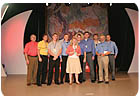
About the only downside of the convention was that normally sunny Maui had a few uncharacteristic days and nights of rain, which caused many outdoor events to be pushed indoors. We counted only one truly sunny day.
Weather aside, the 2,300 attendees heard plenty to take home. Greg Howell, for example, runs the Lean Construction Institute in Ketchum, Idaho, and led a workshop on how to put these concepts into practice. Howell started out his career as a civil engineer, and while working on his degree, he used to film construction sites.
“We'd ask, why does it look like it does in the field?” Howell explained. While labor utilization remains key, Howell began to see the importance of first improving the predictability of workflow in order to help foremen actually do what they say they will complete.
Howell defined lean construction in terms of production management. “Lean construction extends from the objectives of a lean production system - maximize value and minimize waste - to specific techniques and applies them in a new project delivery process,” he said. As a result, lean contractors may be able to better accomplish the following objectives:
- The facility and its delivery process are designed together to better reveal and support customer purposes.
- Work is structured throughout the process to maximize value and to reduce waste at the project-delivery level.
- Efforts to manage and improve performance are aimed at improving total project performance because it is more important than reducing the cost or increasing the speed of any activity.
- “Control” is redefined from “monitoring results” to “making things happen.” The performance of the planning and control systems are measured and improved.
According to Howell, lean construction is particularly useful on complex, uncertain and quick projects, and challenges the belief that there must always be a trade among time, cost and quality.
Doing what you say you will do may be an important part of lean construction, but it represents an entire philosophy of management, according to another speaker, Mike Scott of Mike Scott and Associates, Tampa, Fla.
“We all expect 100 percent accountability on the job, but how many are actually getting it?” Scott asked. “We often settle for 98 percent, but we all know no one would accept it if their paycheck were 98 percent of what it should be or that you handed out paychecks 98 percent of the year and said you simply couldn't do the other 2 percent.”
Scott gave the following 10 pointers to help put his management tactics into practice:
-
1. Use a consistent system for recording, tracking and prioritizing all tasks and projects.
2. Create an environment where no surprises are allowed.
3. Conduct weekly staff meetings, one-on-one meetings and daily huddles to review some of the “most important” activities for that week.
4. Stop giving excuses to or accept excuses from anyone.
5. Use standard guidelines for conducting all meetings, such as providing an agenda and reviewing the meeting at its end.
6. Do not ask, “Why?” or “Why not?” when someone surprises you with nonperformance. Instead ask, “What's your next step to get it done?”
7. Allow people to say no to a commitment only when they can provide a solution as to how they will get it done.
8. Give and get specific dates and times for completion for all delegated tacks. Have all commitments repeated back. Repeat back all commitments.
9. Eliminate the use of the phrase, “I'll try” or “I'll give it my best” by saying, “I know you're going to try, but what I need to know is can I count on you for the results?”
10. Discontinue the employment of people who are consistently not accountable.

Among his accomplishments, Batz enhanced the programs and services of the Mechanical Service Contractors of America, where he served on and chaired key MSCA committees before being elected to, and then becoming chairman of, MSCA's Board of Managers. Continuing his dedication, Batz became one of the first service contractors to be elected to MCAA's Board of Directors. In 2005, he received MSCA's highest award, the D.S. O'Brien Award of Excellence.
In student chapter news, the following awards were handed out: